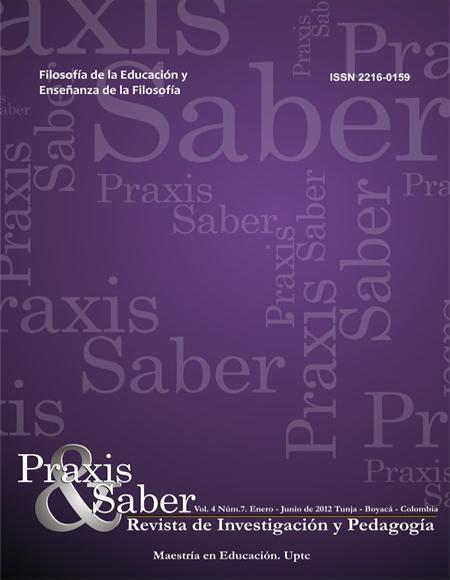A situated didactics of the philosophy a model to attend the estrangement of the teachers

Abstract
Training for Philosophy teachers, in the deductive curriculum frames, generates strangeness in those who carry on their internship and their first labor practices, when they come back to school. How to attend this estrangement from a specific didactics of the philosophy without denying the tension among technical, practical and experiential foregrounds? For this, a model denominated as Philosophy’s specific situated didactics is suggested. Such didactics has in its basis, besides the consideration that education is constituted by the tension of the above mentioned foregrounds, a conception of the philosophy referred to as philosophizing Philosophy, which takes into consideration both the subject of the philosophical activity and the disciplinary object, and is opposed to the academism from a perspective that nourishes itself in the situated thought as a philosophic category and in the experience understood as the transformation of subject. That’s why the mentioned didactical model breaks with the explanation, as the university teaching axis, and relies on the narration as the contact point for those involved in the training of trainers and those who begin in Philosophy teaching.Keywords
philosophy teaching, teachers training, narration.
Author Biography
Laura Susana Morales
Licenciada en Filosofía, Universidad Nacional del Sur Argentina
Profesora Universidad Nacional del Sur, Argentina
María Belén Bedetti
Profesora de Filosofía, Universidad Nacional del Sur, Argentina
Ayudante de Cátedra, Cátedra Didáctica Especial de la Filosofía
Departamento de Humanidades, Universidad Nacional del Sur,
Argentina
References
- Benjamin, W. (1991). ‘El narrador’. Para una crítica de la violencia y otros ensayos (pp. 111-134). Madrid: Taurus.
- Cerletti, A. (2008). La enseñanza de la filosofía como problema filosófico. Buenos Aires: Libros del Zorzal.
- Cerletti, A. & Kohan, W. (1996). La filosofía en la escuela. Caminos para pensar su sentido. Buenos Aires: Oficina de Publicaciones del CBC y Programa La UBA y los profesores secundarios.
- Derrida, J. & Dofournantelle, A. (2006). La hospitalidad. Buenos Aires:
- Ediciones de la Flor.
- Lértora Mendoza, C. & Domínguez, R. (2010). ‘Filosofía situada: una
- hermenéutica para la historia de la filosofía argentina y latinoamericana’.
- Ágora filosófica, Vol. XI. Nº 21-22. Recuperado el 02 de agosto de 2012 de http://www.agoraphilosophica.com.ar/agora21-22/agora21-22- lertora.pdf
- Foucault, M. (1991). Tecnologías del yo y otros textos afines. Barcelona: Paidós.
- —— (2009). Hermenéutica del sujeto. Buenos Aires: Fondo de Cultura
- Económica.
- Hadot, P. (2006). Ejercicios espirituales y filosofía antigua. Madrid: Ediciones Siruela.
- Kohan, W. (2007). Infancia, política y pensamiento. Buenos Aires: Del
- estante editorial.
- Larrosa, J. (2003). ‘La experiencia y sus lenguajes’. Serie Encuentros y
- Seminarios. Recuperado el 26 de agosto de 2011 de http://www.me.gov.ar/curriform/publica/oei_20031128/ponencia_larrosa.pdf
- Morales, L. & Rodriguez, L. (2011). ‘La filosofía en los contextos de las
- políticas curriculares desde los noventa. Un análisis desde la filosofía
- filosofante’. Ponencia presentada en las XVII Jornadas sobre enseñanza de la Filosofía, Coloquio internacional. Universidad de Buenos Aires.
- Obiols, G. & Rabossi, E. [comps.] (1993). La filosofía y el filosofar: problemas de su enseñanza. Buenos Aires: Centro Editor de América Latina.
- Pogré, P. & Krichesky, G. (2005). Formar docentes. Una alternativa
- multidisciplinaria. Buenos Aires: Papers editores.
Downloads
Download data is not yet available.